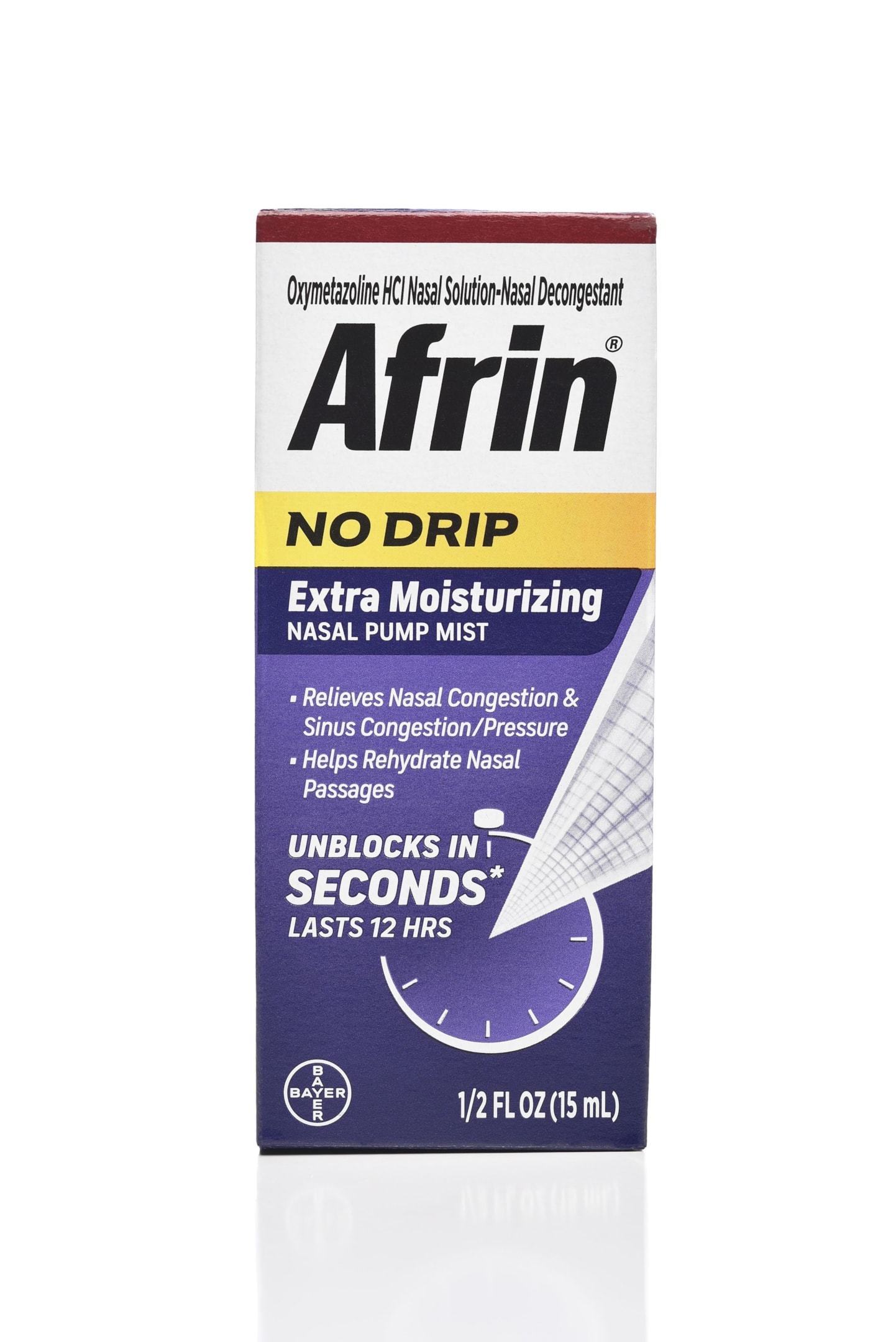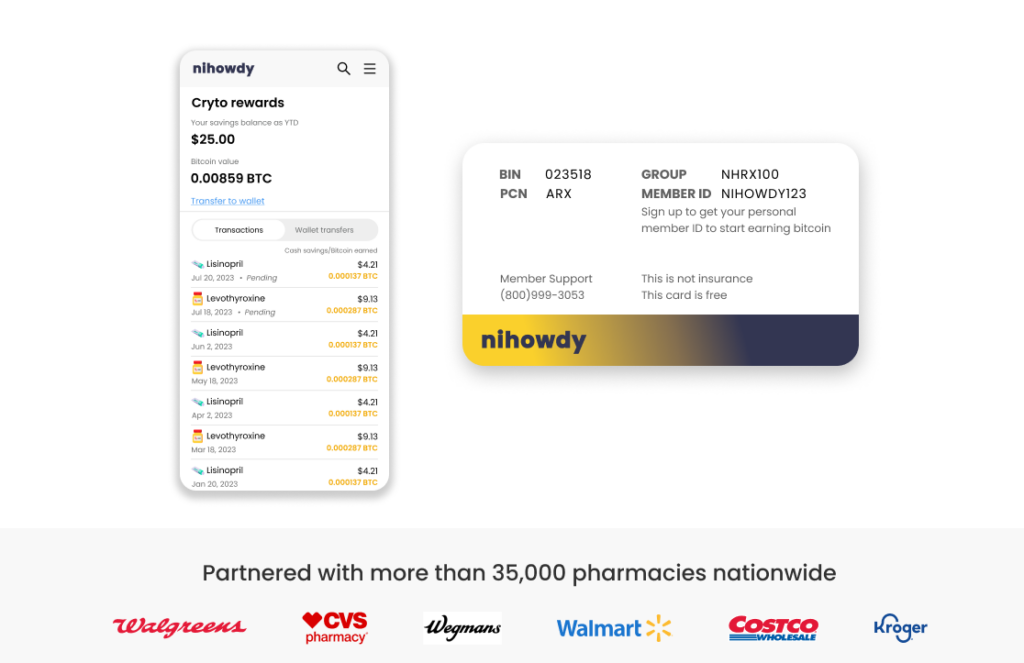Afrin vs Flonase: Which Nasal Spray Wins for Allergy Relief?


Deciding between Afrin and Flonase when congestion and allergies hit can be challenging. In this post, we’ll break down the quick relief of Afrin vs Flonase and the long-term control of Flonase so you can figure out which nasal spray is right for you.
Quick Hits
Afrin provides immediate relief for congestion, lasting up to 12 hours, but using it for more than three days in a row can lead to rebound congestion.
Flonase is a comprehensive solution for allergy symptoms. It acts over a more extended period and controls inflammation, but it takes longer to kick in fully.
Afrin and Flonase are over-the-counter medications with generic cost-saving options, and prescription discount cards like NiHowdy’s offer even more savings.
Afrin and Flonase: The Basics

Nasal sprays Afrin and Flonase are well known but serve very different purposes. When congestion hits from a cold, hay fever, or other respiratory allergies and your nose is like a clogged street, Afrin steps in with oxymetazoline as the active ingredient for quick relief on an interim basis.
On the other hand, when you’re playing the long game against allergy symptoms, Flonase is like an endurance athlete among nasal sprays. With fluticasone propionate as the active ingredient, Flonase doesn’t just relieve the stuffiness but also tackles a broader range of allergy symptoms, such as:
itchy and watery eyes
itchiness in the nose
runny nose
sudden sneezing
It also lasts 24 hours. So, Zicam Sinus Relief with Flonase might be for you if you need around-the-clock relief from annoying nasal allergy issues.
When deciding between Afrin and Flonase, consider what’s more important: Is quick decongestion your top priority? Then, choose Afrin.
If overall control over multiple allergy symptoms matters most to you, we welcome you to Flonase Allergy Relief.
Quick Nasal Congestion Relief: Afrin’s Fast Action

When you’re congested, your breathing can feel like your nose is completely clogged. Afrin steps in as a decongestant nasal spray that relieves. Its active ingredient is oxymetazoline, which shrinks the blood vessels in your nasal passages, relieving you temporarily from the blockage and helping manage symptoms of a stuffy nose.
The best part of Afrin is its quick action. This nasal spray kicks in almost instantly after use, clearing congestion in minutes. It keeps airways open for up to 12 hours, giving you relief for half the day.
While great for immediate symptom relief, Afrin should not be used for extended periods. Using it for more than three days in a row can cause a rebound effect on your original condition—the phenomenon where your original symptoms come back even stronger after treatment—like pushing harder on a swing, getting you higher, but ultimately bringing you back down again.
Long Term Allergy Relief with Flonase

Flonase is like an endurance athlete, not a quick fix like Afrin. This steroid nasal spray provides anti-inflammatory benefits that go beyond relieving nasal congestion. It also tackles allergy symptoms like sneezing, runny nose, and itchy eyes. Flonase doesn’t just mask these symptoms; it tackles the underlying inflammatory process that causes them.
What sets Flonase apart is its broad spectrum of action. It goes beyond most other allergy medications, which target only one allergen, by neutralizing six essential substances that cause allergic reactions. So, Flonase is an all-in-one therapy for multiple nasal allergy symptoms.
But just like a marathoner needs time to reach their peak performance, Flonase needs some time to kick in.
The Gradual Effect of Steroid Sprays
Unlike immediate-action decongestants like Afrin, Flonase, and other steroid sprays, Flonase takes a little more time—several days or weeks—to reach its peak effect. Flonase works towards long-term results even if the relief isn’t instant with these medications.
The gradual effect ensures it tackles multiple symptoms of allergies—runny nose, sneezing, and itchy eyes. Think of using Flonase as a defense strategy against allergies, not just for symptom relief on the spot.
Side Effects Comparison: What to Expect
Every medication, including Afrin and Flonase, has side effects. The main issue with Afrin is rebound congestion after more than three days of use. Flonase doesn’t have this risk. This rebound effect can last a year or more and worsen your nasal blockage.
Both medications may irritate the nose area, manifesting as a burning or stinging sensation, itchiness, and sneezing. These nasal irritation symptoms are usually short-term and will subside as you get used to the medication.
As for other side effects unrelated to the nose, you may experience headaches or be more prone to nosebleeds while using Flonase. Afrin is not commonly associated with headaches but may still irritate the nose.
Always weigh the pros and cons of any medication before taking it. If you have concerns about these, talk to your doctor.
Dosage and Administration: How to Use Nasal Sprays
Follow the prescribed dosage for Afrin and Flonase. Afrin is 2-3 sprays per nostril for those six years and above, no more than every 10-12 hours. Do not exceed two applications in 24 hours.
Flonase usage:
For adults and children four years and above
Start with two sprays per nostril once a day. Later, reduce as needed.
For children 4-11 years old: 1 spray per nostril daily
Please don’t use it more than two months in a year without consulting a doctor
For those below four years old, consult a doctor before use.
If you miss a dose of Flonase? You don’t need to double up later. Just omit the missed dose and resume the usual dosage next time. Regularity is vital to managing allergy symptoms.
Which to Choose: Afrin vs Flonase
When deciding between Afrin and Flonase, it’s essential to consider your specific needs. Afrin is the ideal choice if you require quick relief from nasal congestion. It constricts the blood vessels in your nose, providing fast and effective relief.
On the other hand, if you suffer from multiple allergy symptoms and prefer a more comprehensive approach, Flonase is the better option. Flonase addresses the underlying inflammation that causes these symptoms, offering broader and more sustained relief.
Cost and Availability: OTC

Afrin and Flonase are available over the counter, so you don’t need a prescription. This makes it easier to relieve allergy symptoms.
If you’re on a budget, generic versions of Afrin and Flonase are available. They give the same allergy symptom relief but at a lower price than the brand name.
Save More with Prescription Discount Cards
Meet the NiHowdy prescription savings card, which offers transparent pricing and rewards you with Bitcoin for every medication transaction. Yes, every time you refill your prescription, you can earn up to 3% back in Bitcoin.
These rewards can add up over time and help reduce the cost of medications like allergy meds. Plus, they can help you save for future healthcare needs or significant expenses later in life.
Conclusion: Afrin or Flonase for You?
You may not have to choose between Afrin and Flonase. Combining Afrin and Flonase can improve nasal airflow without rebound congestion for some people with allergies and is a great option.
Consult your doctor before combining any medications. Your doctor will give personalized advice based on your health history and needs.
So now you have the information to make an informed decision. And don’t forget you can save and earn rewards if you choose Afrin alone, Flonase alone, or use them together.
Bottomline
Afrin and Flonase are good nasal sprays but serve different purposes. Afrin relieves nasal congestion quickly, and Flonase has been used for broader allergy symptoms over time.
Choose between Afrin and Flonase based on your needs and symptoms. And remember, with NiHowdy’s prescription savings card, you can save on allergy meds and earn rewards, too.
Frequently Asked Questions
Can I use Afrin and Flonase together?
You can use Afrin and Flonase to improve nasal airflow without rebound congestion. Consult your doctor first.
What are the side effects of Afrin and Flonase?
Rebound congestion can happen if you use Afrin for more than 3 days. Both Afrin and Flonase can irritate the nasal passages, and Flonase can cause headaches and nosebleeds.
Be aware of these side effects.
Are there generic versions of Afrin and Flonase?
Yes, Afrin and Flonase have generic versions that can help you save on these products.
Can I save on my allergy meds with NiHowdy’s prescription savings card?
Of course, you can use NiHowdy’s prescription savings card to get discounts and earn Bitcoin for your allergy meds.
How to use Afrin and Flonase?
Adults and children over four can use two sprays of Flonase in each nostril daily and adjust as needed. For Afrin use, children over six can use 2 to 3 sprays in each nostril every 10 to 12 hours.
What allergy symptoms can Flonase help with?
Flonase can help alleviate a wide range of allergy symptoms, including nasal congestion, sneezing, runny nose, itchy and watery eyes, and itchiness. Targeting the underlying inflammation provides comprehensive relief from multiple allergy symptoms.


